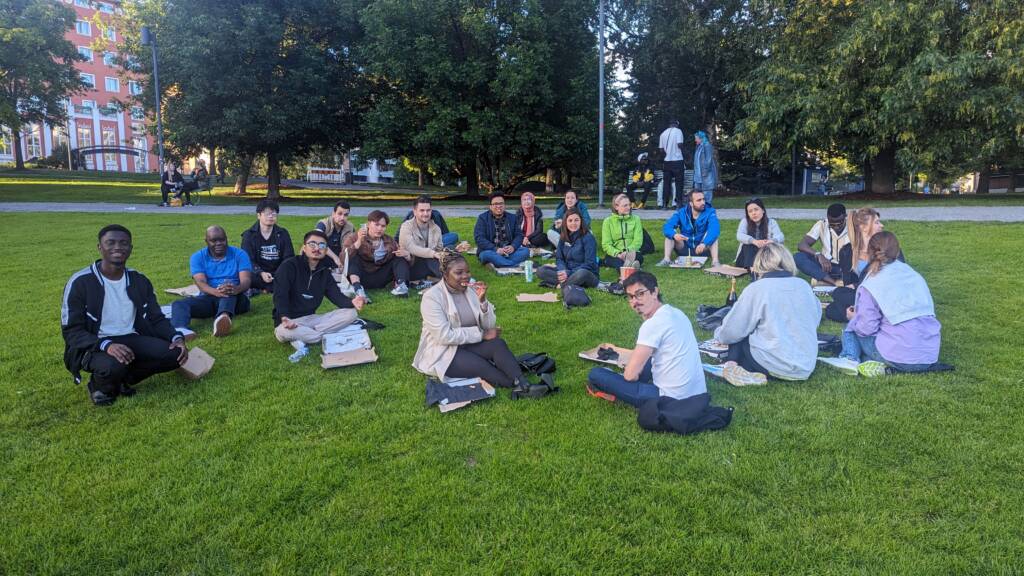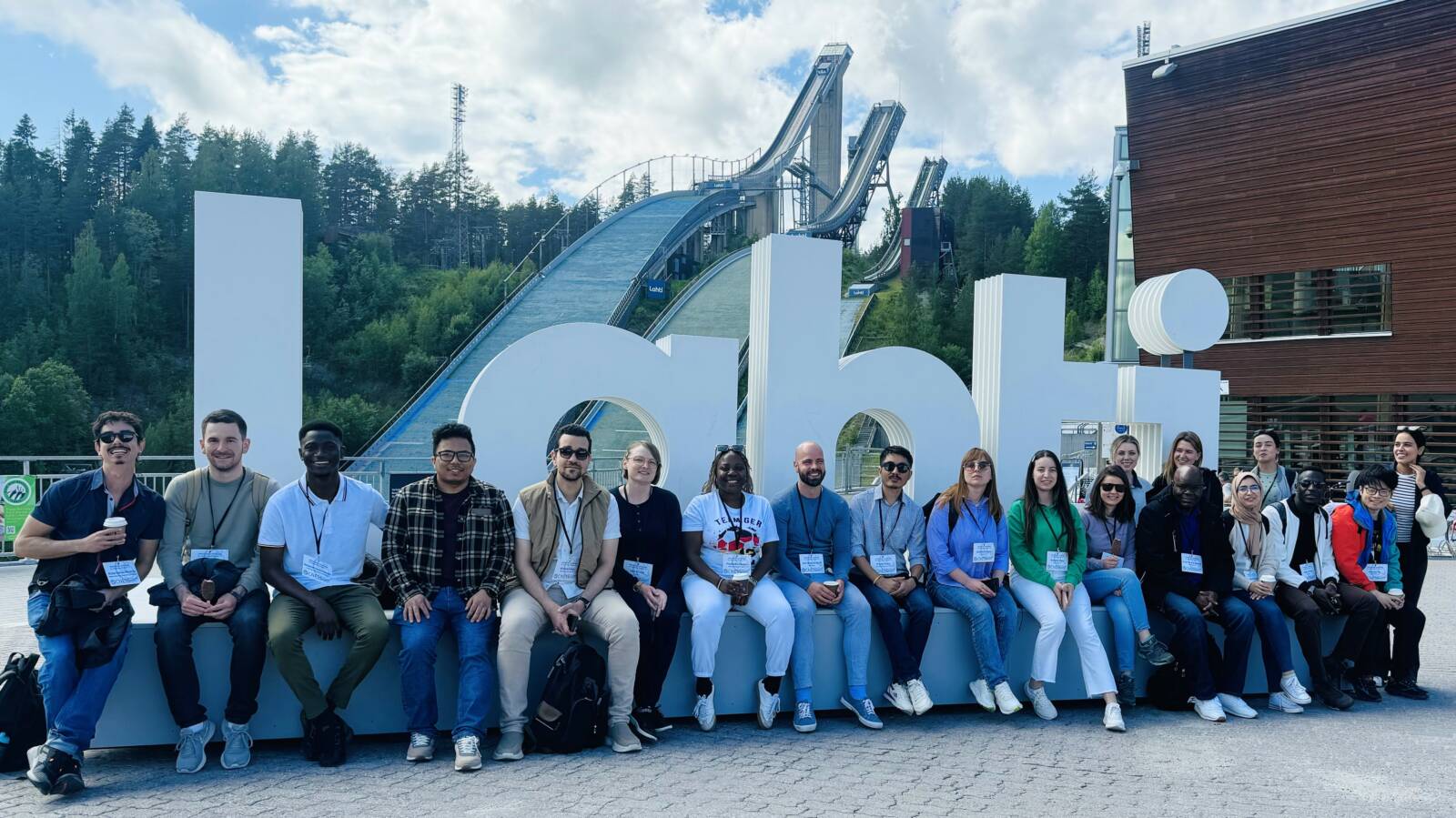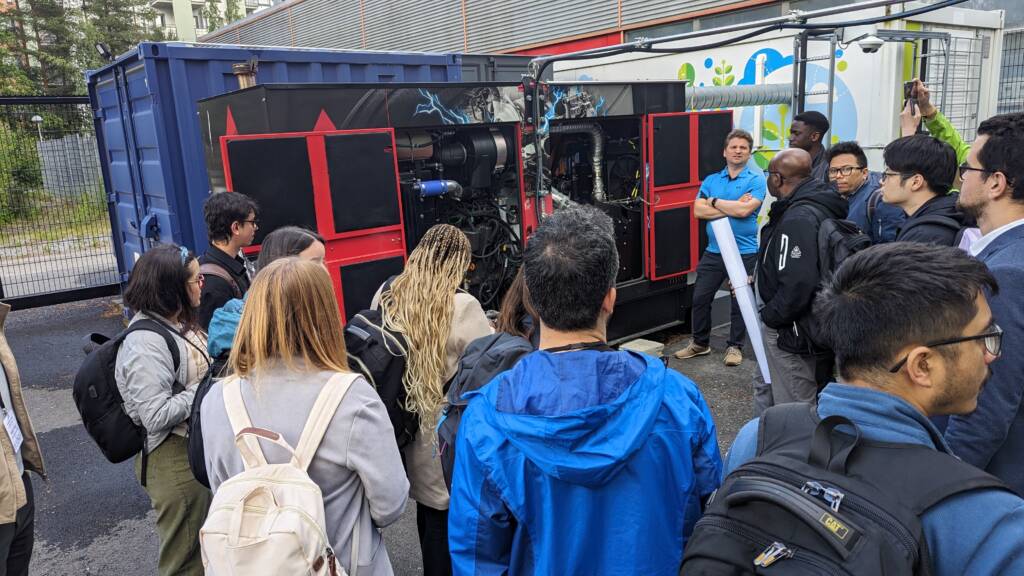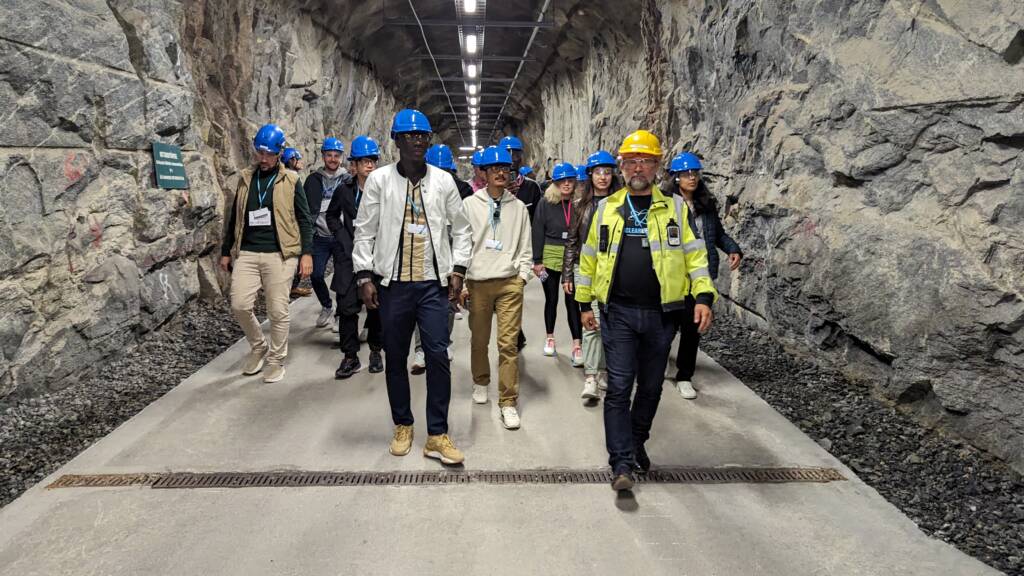CNESS Summer School 2024 on Energy Security
Tampere University, Tampere – Finland
10. June – 16. June 2024
30h in total – 18h contact teaching, two site visits (8h), and an energy simulation (4h), 2 ECTS
s
After two successful summer schools in 2022 and 2023, CNESS decided that its third edition will slightly differ from the preceding years and focus on energy security as an overall theme. Therefore, the program of the summer school 2024 included more security related topics. During the week, 12 speakers presented more than 14 topics on critical raw materials, nuclear safety, grid stability, cyber security, air quality, hydrogen and many more. In addition, also the participants had to be involved in energy-related topics, either in research or professional work. After receiving more than 120 applications and a long selection process, CNESS welcomed 22 doctoral or postdoctoral researchers and professionals from various disciplines and social backgrounds, representing 20 countries.
The primary goal of CNESS’s summer school remained unchanged: to provide students and young professionals with a comprehensive overview of energy fundamentals, covering technological, economic, and societal aspects in relation to the concept of energy security. Within the program, participants were guided through the core components of the energy system and the journey toward climate neutrality while ensuring energy security for all consumers of energy. Additionally, a social program introduced attendees to the Nordic/Finnish society, culture, and nature.
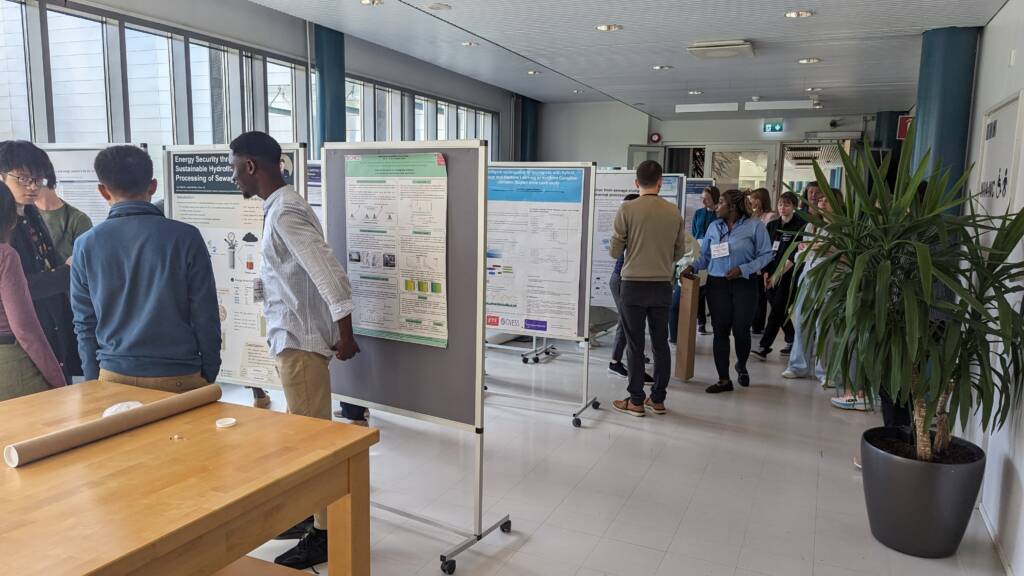
Program:
On Monday, the summer school began with CNESS coordinator Carl Johannes Muth welcoming the participants and providing a brief tour of the city center campus. He shared background information about Tampere, Tuni, and the research platform. In April, during a webinar, Carl had already presented the research platform, the summer school, and CNESS’s objectives for this one-week intensive course. Upon arriving at the lecture room in Pinni B, participants had time for networking and discussing their posters. Like previous summer schools, all attendees were required to present their research findings in several poster sessions. However, based on feedback from the 2022 and 2023 participants, this year CNESS allocated more time for discussions between participants and speakers about their research and posters, ensuring better networking and mutual learning.
CNESS lead PI, Jean-Monnet Professor Pami Aalto, officially opened the summer school with an introduction to energy policy and its interplay with energy systems in the past, present, and future. He addressed the most prominent questions regarding energy policy, including how policy shapes the energy system and vice versa, the policy tools available to actors, and the role of International Relations (IR) in this context. After the lunch break, Pami’s second session focused on the concept of energy security in the 21st century, discussing the threats and vulnerabilities of energy systems and the particular interests of various actors in the field. For many participants with primarily technical backgrounds, the political dimensions and multifaceted nature of energy security were new, leading to numerous questions and an intensive discussion during the lecture. Building on this, Professor Yrjö Majanne presented his current research on (green) hydrogen and its production, storage, transport, and end-use, with a special focus on its overall technical potential as an energy carrier in future energy systems. Similar to Pami’s session, and throughout the entire week, intensive discussions emerged around the topic, with participants drawing on their diverse backgrounds to help each other see the issue from different perspectives. The day concluded with an official welcome dinner at Ravintola Tampella, where participants had the opportunity to get to know each other and some of the CNESS speakers.
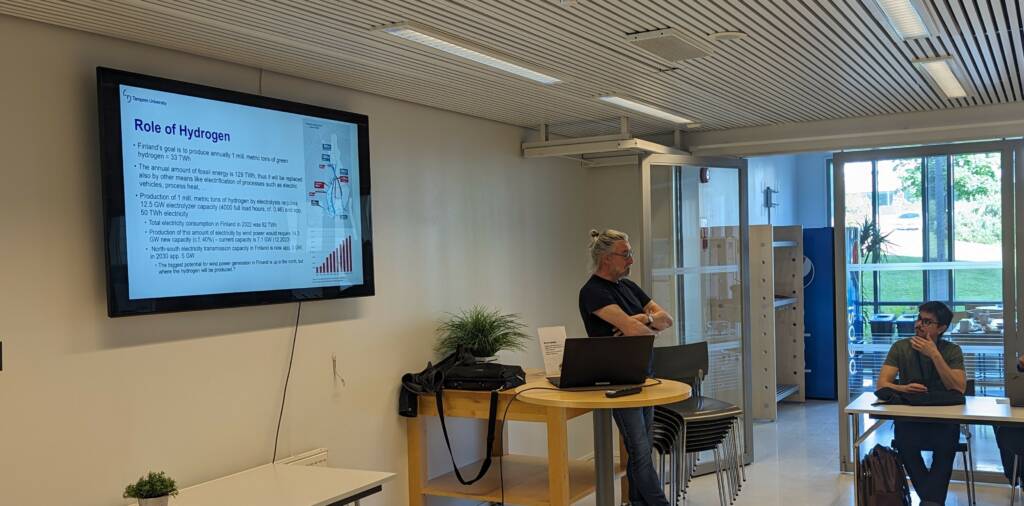 The second day began with Carl introducing the participants to the energy simulation exercise and dividing them into smaller groups, each assigned a specific task. The morning continued with an open poster session until Sami Repo delivered his first lecture on electric system reliability and security. In this technology-focused presentation, Sami discussed the challenges of grid management with a high share of renewables, inertia, and the future of electricity markets. In the afternoon, Sami’s second lecture delved into the potential of hydrogen as a flexible energy carrier for balancing a 100% renewable energy system, building on the information from his first session and Yrjö’s lecture the previous day. The day concluded with a presentation from Professor of Practice and security expert Valtteri Vuorisalo, who discussed the role of technology and data in energy security. Valtteri’s extensive experience in the military and business sectors provided participants with a unique perspective on security-related issues, sparking considerable discussion.
The second day began with Carl introducing the participants to the energy simulation exercise and dividing them into smaller groups, each assigned a specific task. The morning continued with an open poster session until Sami Repo delivered his first lecture on electric system reliability and security. In this technology-focused presentation, Sami discussed the challenges of grid management with a high share of renewables, inertia, and the future of electricity markets. In the afternoon, Sami’s second lecture delved into the potential of hydrogen as a flexible energy carrier for balancing a 100% renewable energy system, building on the information from his first session and Yrjö’s lecture the previous day. The day concluded with a presentation from Professor of Practice and security expert Valtteri Vuorisalo, who discussed the role of technology and data in energy security. Valtteri’s extensive experience in the military and business sectors provided participants with a unique perspective on security-related issues, sparking considerable discussion.
Energy security extends far beyond the steady flow of fossil fuels and electricity. In recent years, the focus has expanded to include the various materials essential for energy production and a fully functioning renewable energy system. Critical materials such as lithium, cobalt, and rare earth elements have become headline topics, highlighting the challenges of mining, producing, or acquiring these materials from third parties. CNESS coordinator Carl Johannes Muth introduced the students to the challenges related to critical raw materials, providing insights from his own research on the ongoing discussions around the Rio Tinto lithium mining project in Serbia, which served as an ideal case study. In the following, postdoctoral researcher Sarah Kileläinen addressed local heat security as part of the heat transition. She presented her research on the just heat transition in Finnish residential buildings, including the results of over 30 narrative interviews about personal “heat stories.”
Following this in-depth exploration of various energy-related security challenges from both macro and micro perspectives, the participants embarked on their first field trip to Lahti, which was awarded the title of European Green Capital in 2021 (European Green Capital Award, EGCA). They enjoyed a guided tour of the city, starting at the sports center with its iconic ski jumping towers, and continuing to the harbor, sustainable living areas, the power plant, and historically and culturally significant sites. During the tour, Jana Parpala from Visit Lahti explained the city’s innovative strategy, addressing questions about the motivations behind Lahti’s transformation, the associated costs, public acceptance, and future plans.
Given CNESS’ integration of Tampere University’s energy research expertise from five faculties across three campuses, the summer school includes lectures at the Hervanta campus each year. This campus, a short twenty-minute tram ride from Tampere’s city center, hosts several engineering and natural sciences research groups from CNESS. Therefore, at the Festia building, the fourth day began with Professor Ulla Saari’s lecture on renewable and sustainable energy production within the context of a circular economy. She explained the basics of the circular economy, necessary considerations, and shared some of her own research findings. Following this, Kari discussed the importance of software, data, and information technology for energy communities and microgrids within the energy ecosystem. He highlighted the issue of “invisible” energy consumption and how data can enhance efficiency in future energy production and consumption. During both Ulla’s and Kari’s lectures, lively discussions emerged, allowing participants to combine their research findings and experiences with the presented topics, thereby deepening their understanding and broadening the perspectives for all people present including the speakers.
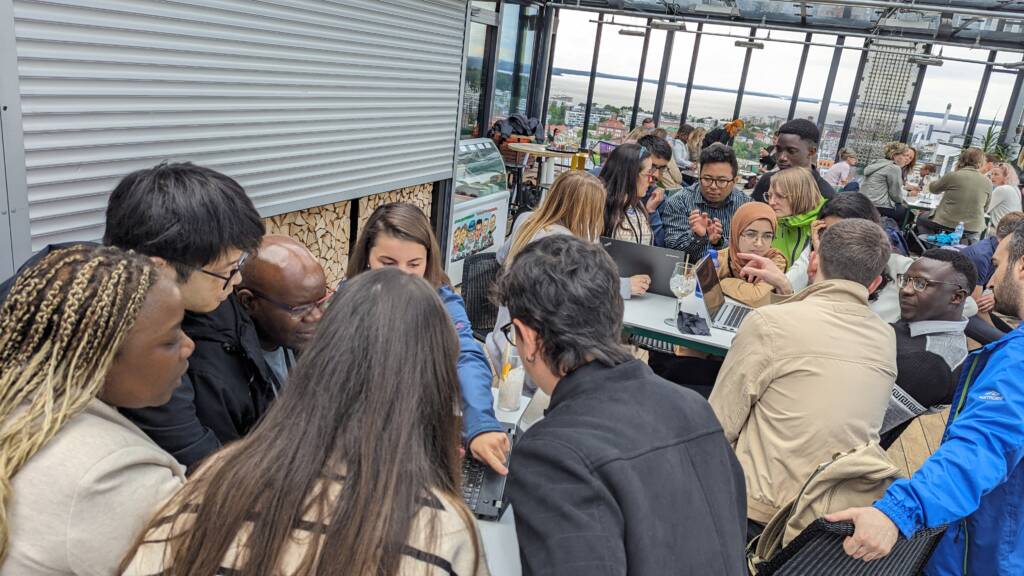
After the lunch break, the sessions continued in Kappelisali, known for its unique acoustics. Panu Karjalainen delivered a lecture on emissions and air quality impacts, a topic that often gets overlooked in energy security discussions. He emphasized the environmental impacts of energy consumption and production on air quality, which have gained more attention from the security community in recent years. Panu also addressed hidden emissions from the transport system, the problems of the predominant focus on CO2 in emission discussions, and why electric vehicles can have higher non-CO2 emissions than internal combustion vehicles. As part of the lecture, participants visited the mobile Atmolab to see how data for Panu’s research group is generated.
At the fifth and last day of the summer school, the participants went to see the the Olkiluoto nuclear power plant in the western part of the country. Finland is one of only three countries in Europe that newly built a new nuclear power reactor and the first-ever country to build long-term storage for high-radioactive nuclear waste. After arriving at the plant site, the participants had some small snacks and coffee before Mika Tanhuanpää from Voima Oyj, gave a company presentation including Finland´s energy production, the power plant and future plans as well as answered a numerous of questions from the participants. Afterwards, Mika guided the attendees around the underground low and mediate-level radioactive waste repository where they learnt about the difficulties of radioactive waste disposal and how Finland plans to solve an almost century-long pending problem on how to safely store the waste for the next 100.000 years. After being back on ground levels, the participants had the chance to see science exhibition “Electricity from Uranium” and walk the nature path around the power plant´s area until heading back to Tampere which also means the end of the summer school´s academic program. The day concluded, like the previous years, with joint a joint pizza dinner in the park next to the Tammerkoski rapids.
Besides the poster sessions and discussions, the participants applied their knowledge in an energy simulation exercise at the end of day four at Moro Sky Bar. This location, high above the roofs of Tampere, offered fantastic views of the city’s surrounding nature and lakes when the rain clouds permitted. Before this, participants worked in small groups representing specific interest groups or regions to create unique policy sets aimed at combating global warming. At the bar, their task was to discuss these policies with other groups and agree on a common strategy. Despite their pre-existing expertise and the knowledge gained during the multidisciplinary five-day program, navigating the recently updated version of the En-ROADS simulation (May 2024) proved challenging, even for established energy and climate research experts.
On the fifth and final day of the summer school, the participants visited the Olkiluoto nuclear power plant in western part of the Nordic country. Finland is one of only three European countries to have recently built a new nuclear power reactor and the first to construct long-term storage for high-level radioactive waste. Upon arrival at the plant site, participants enjoyed snacks and coffee before Mika Tanhuanpää from Voima Oyj gave a company presentation. He covered Finland’s energy production, the specifics of the power plant, future plans, and answered numerous questions from the participants. Following the presentation, Mika guided the attendees around the underground low and intermediate-level radioactive waste repository. Here, they learned about the challenges of radioactive waste disposal and how Finland plans to address the century-old problem of safely storing waste for the next 100,000 years. After returning to the surface, participants visited the “Electricity from Uranium” science exhibition and walked the nature path around the power plant area until heading back to Tampere, marking the end of the summer school´s academic program. The day concluded with a joint pizza dinner in the park next to the Tammerkoski rapids, mirroring the tradition of previous years.
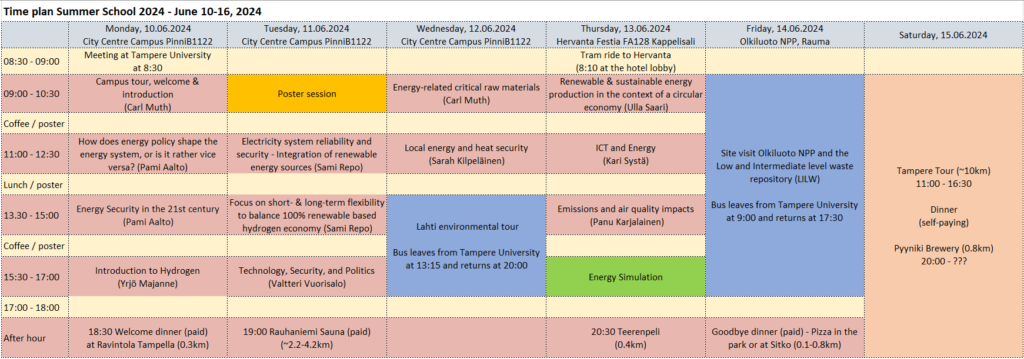
Social program:
Attending a summer school also includes gaining insights into the host country’s culture and society. Many participants had never been to Finland before and knew little about the country. Finland is renowned for its vast nature, thousands of lakes, and, of course, saunas. After the lectures, participants could join an after-hours social program that included a visit to Rauhaniemi Sauna with a refreshing dip in the lake, the Pyynikki Brewery Beer Garden, a tour around Tampere to see the historic parts of the town, and many other activities. At Ravintola Tampella, located in a former factory building, participants experienced Tampere’s textile industry history and sampled emerging Finnish cuisine. Visits to the rooftop bar Moro provided students with a unique view of the city and the surrounding nature, including the two main lakes, Pyhäjärvi and Näsijärvi. Additionally, participants could rent bikes from the hotel for free to explore the city on their own. Moreover, despite the rainy weather this year, the summer school days often concluded with drinks and food outside or in one of Tampere’s bars and nightclubs, enjoying the never-ending daylight in Finland in June.
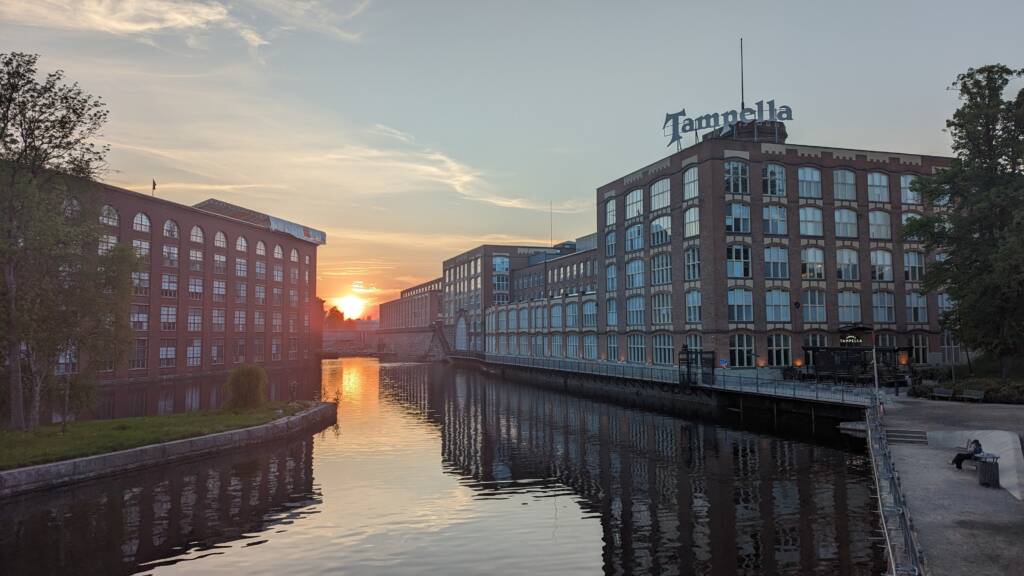
Participants and their feedback
For its third summer school, CNESS aimed to bring together a diverse group of participants in the field of energy security from various social and academic backgrounds, encompassing fields such as engineering, architecture, social sciences, politics, business, and law. Therefore, in April 2024, CNESS selected a group of nine doctoral researchers, six postdoctoral researchers, one assistant professor, and five professionals representing 17 countries and five continents to participate in an intensive one-week program in Tampere. Fourteen of these participants have already worked or studied abroad, allowing them to contribute valuable insights from their experiences in different regions. This diversity of perspectives enriched the discussions and enabled participants to gain a deeper understanding of the energy system and its challenges.
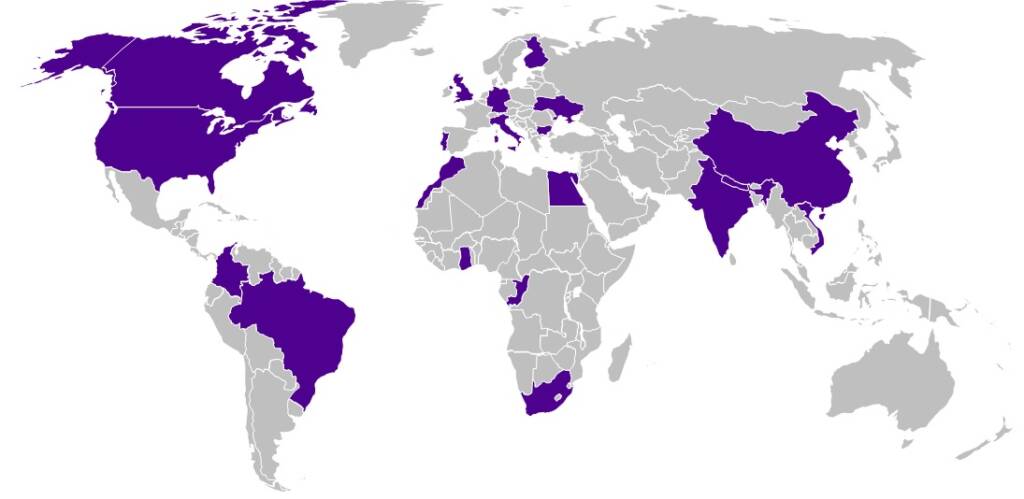
Summer School ratings
Speakers & topics 9.6
Site visits 8.8
Organization 9.5
Accommodation 9.6
Likely to recommend 9.8
Social program 9.3
Overall rating 9.5
c
– 1 (poor) to 10 (very good) –
(outliners removed)
s
“I really like the cooperation and the coordination by Carl. The lectures and the site visit were amazing. I got a chance to connect with new researchers and people from all around the world.”
s
“It was diverse in themes and activities, well-structured/planned, and a great opportunity since most of the costs were covered!”
s
“What I really liked about the summer school was, first of all, the readings, which were up to expectations, and also the fact that the program communicated was the one respected by the organizers, with, of course, some forced flexibility due to the weather. Also the fact that we had the opportunity to present our work following a poster to outstanding colleagues who are similarly selected very carefully.”
s
“I liked it very much! I also told my supervisor that it would be a good recommendation for other PhD students. The topics were interesting and topical, with a nice variety of perspectives. The visit to the nuclear power plant was good, great to have that opportunity.”
